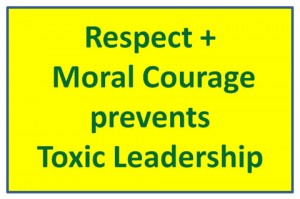 [September 13, 2013] Articles on toxic leadership and how to spot a bad boss have been fashionable of late.
[September 13, 2013] Articles on toxic leadership and how to spot a bad boss have been fashionable of late.
There is no denying that failed leaders are not uncommon and that some will be discovered; and with due diligence removed before too much damage is done to the organization and to people’s careers. Many of these poor leaders lack common sense, are arrogant, vindictive, and in some cases simply too passive to take strong action.
What we don’t see much of, at least I cannot find any, are articles on toxic leadership with senior executive leaders. They surely exist; the sheer numbers of senior leaders would suggest this likely. Perhaps there is some institutional Darwinism for organizations where a toxic senior leader destroys the organization or the senior leader is removed without fanfare.
We are, however, more likely to find senior executive leaders that fail along a number of paths that lead to a toxic work environment and institutional tolerance for mid- level toxic leaders. The toxic environment develops because senior leaders fail to raise the moral courage to take on serious problems.
A lack of moral courage is a great danger in leaders and there is no psychological test we can administer to discover if such a quality is deficient.
Relevant to this discussion, is progressing trend in our society that affects senior executive leaders. There is increasingly a lack of respect across a wide range of human interactions. With this trend, runs a lack of tolerance and hypersensitivity on a short range of subjects (usually race, gender, religion, and politics).
Add to this an increasingly litigious society that attacks any perceived wrong and we have a toxic brew that directly affects the ability of senior executive leaders to tackle tough measures to keep the organization on track. A senior leader with low moral courage and with an overly sensitive and intolerant work force can combine to slowly strangle an organization from within.
Senior executive leaders need to be particularly vigilant to ensure they personally maintain their focus. There are a number of 360-degree assessment tools available to help the leader look within himself, but the old-fashioned trusted friend and valued mentor can be most helpful and discrete. These folks have no stake in the senior leader’s organization and can provide a valuable, outsider’s critical perspective.
The challenges are enormous. Well-maintained professional relationships, built upon trust and confidence, will go a long way to providing a lifeline to the senior executive leader.
